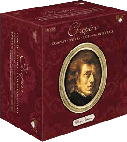 |
 CHOPIN COMPLETE WORKS - L'OEUVRE INTÉGRALE
CHOPIN COMPLETE WORKS - L'OEUVRE INTÉGRALE
Format: 30 CD BOX
Label: Brilliant Classics
Cat Number: 93217
Publication date: without date, but probably 2007.
We are reviewing the box in our possession we bought about two years ago.
First of all, this is not a complete edition, because three important works are absent, that is (1.) the Rondo for two pianos in C major (Op. 73), (2.) the Mazurka to Émile Gaillard, which is not a posthumous work, as many still believe, but it has been published without opus number during Chopin's life, and (3.) the Variations for piano, four hands, on a national air by Moore.
The starting plan was a nice one: 17 discs for opera omnia (just previously published) and 13 for the historical recordings. But the box has been patched together by unqualified people.
Therefore, we recommend not to buy this box, until the publisher depresses its price under € 20,00. It would be just a charity to Brilliant's! Nevertheless, at a price lower than € 20,00 it could be worth.
Since this box has been patched together—as we have just said—by unqualified people, there are a lot of faults, which however we will not list (for ex. the Mazurkas Op. 33 and Op. 41 are given in a wrong order).
Though you read on the back “Livret en français par Ates Orga (Booklet in French by Ates Orga), the copyright symbol (i.e. © Ates Orga 2007) has been printed after the first chapter (“Biography and Works' presentation”, pp. 9÷63), whereas the chapter “Interpreting Chopin” (pp. 64÷72) seems to be anonymous. Hence, we will leave out to point out the nonsense we have found there. The last chapter “The Golden Age of Piano Masters: Biographies” (pp. 73÷84), anonymous as well, gathers biographical information about the performers of the historical recordings; then, the reader finds (pp. 85÷90) biographical sketches regarding the pianists of the Chopin (un)complete works' section. But, for a reason one may charge only to deplorable and negligent people, several players have been left out: these are Misha Dichter (Op. 13), Sergio Fiorentino (Op. 58), Emil Gilels (Op. 35), Anna Haase (soprano, together with his accompanist Lucius Rühl), Evgeny Kissin (the two Concertos), Artur Moreira (Op. 2) and Fred Oldenburg (Op. 4 & Écossaises).
We cannot waste our time in reviewing all the performers. But, let us consider the best. (Anyhow, we cannot avoid expressing our negative evaluation of the soprano: it is a difficult task to sing in a worse manner. Her uttering defects are so many that one cannot listen to.)
The Nocturnes (Harasiewicz), the Etudes (Lortie), the Waltzes (Kocsis), the Sonatas No. 2 (Gilels) and No. 3 (Fiorentino) and the chamber music (V. & C. Ceccanti, and S. Gragnani) are, in this order, the best performances. Well-renowned pianists are less valuable, like Kissin (the two Concertos) and Bella Davidovich (Ballades, Impromptus, and Preludes), who has forgotten how she used to play Chopin. The Mazurkas by Cor de Groot, a good pianist, are played on an 1847 Pleyel which sounds badly like all the pianos restored. The Mazurkas are the most difficult works to play, and unfortunately, Cor de Groot is not able to understand the soul of those jewels.
Let us pass to the historical recordings. Who selected them, did not follow a well definite principle; nevertheless, there is something interesting. Of the Sonata Op. 35, you find the Rachmaninov's splendid recording, the Godowsky's heavy one, the Kilenyi's laborious test (but the last movement is fairly acceptable), and the Cortot's valuable interpretation. The Sonata Op. 58 is given by three different interpreters: Cortot, Lipatti, and Brailowsky. The latter, less known, must be pointed out, because it shows Brailowsky in full possession of his faculties with those good points, both technical and interpretative, which will disappear in the more recent recordings, letting uncovered all the faults. Solomon is an elegant and refined pianist whom you can listen to with pleasure. We may not forget the Lipatti's phantastic interpretation of Waltz op. 34, No. 1. Simon Barere possessed a prodigious technique, but he was a second-rate interpreter. Two discs have been filled with Moiseiwitch's recordings (Scherzos, Sonatas and Preludes); he was a great pianist indeed, but his interpretations look dated. In disc No. 24, there is a splendid performance by Rosenthal of the Etude No. 2 from the three composed for the Moscheles' Méthode des Méthodes, but also a bad execution of 4th Scherzo by Horowitz. A. Kitain is one of few who play the Etude Op. 10 No. 6 following the Chopin's metronome. The Friedman's performances, even if questionable at times, are always exciting. The last three discs are for both Rubinstein's Polonaises (except the posthumous ones) and Mazurkas. His Mazurkas remain, even nowadays, the best complete collection, even better than the one which later Rubinstein himself recorded for RCA. Here you can find the Mazurka to Émile Gaillard missing in the (un)complete section, and which, together with the Mazurka “La France Musicale”, is erroneously marked as posthumous.
If you use a computer, do not pay attention to the tracks' titles, because a lot of them are wrong.
At last, who gave his O.K. for printing this box, ought to be kicked in the bottom!
[All rights reserved © Franco Luigi Viero]
